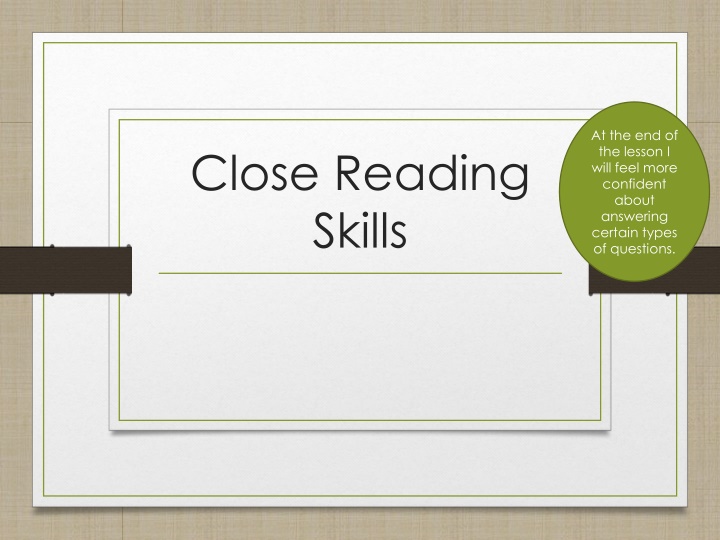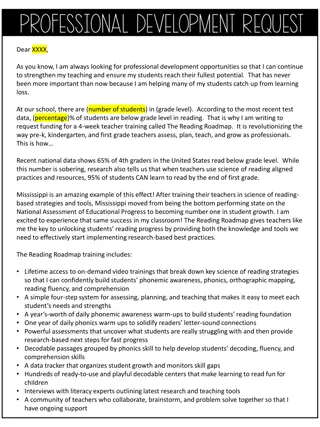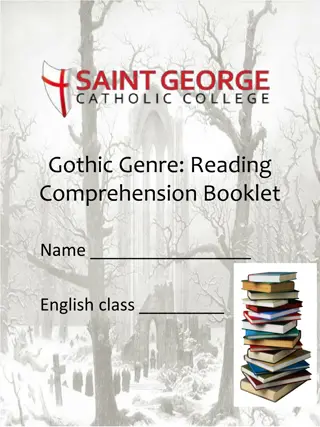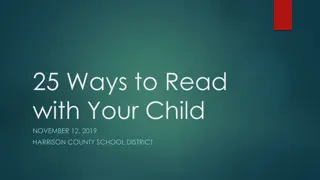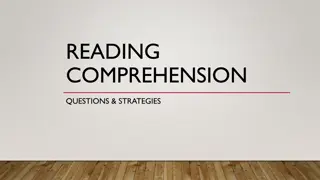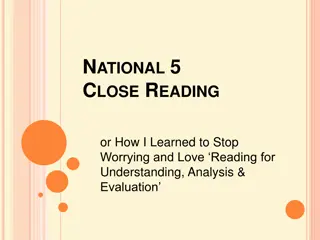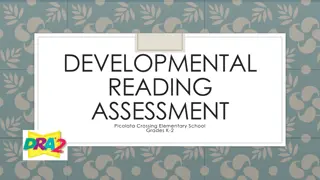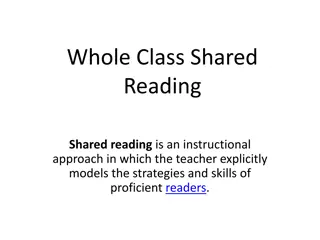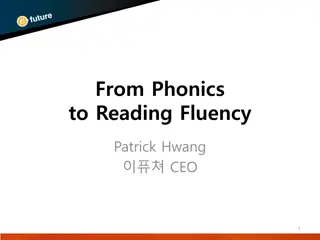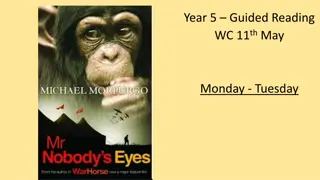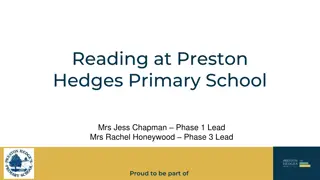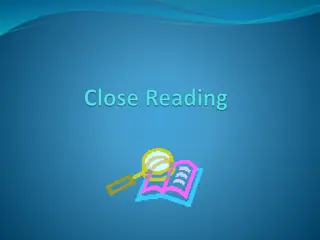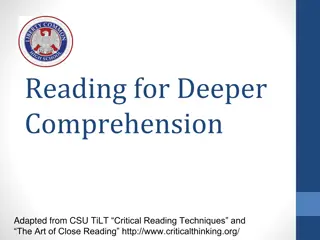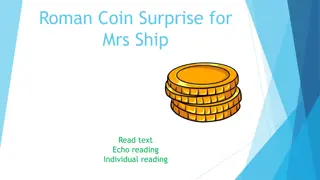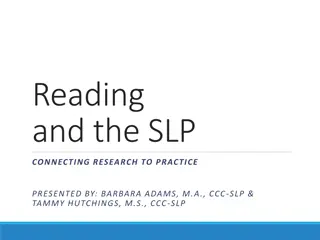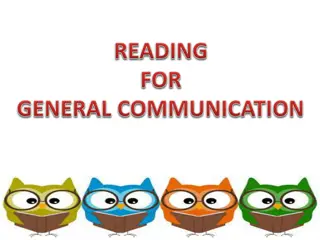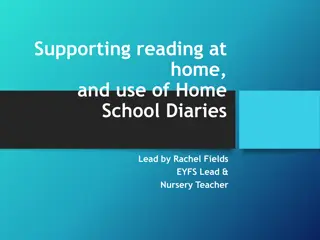Enhancing Close Reading Skills for Better Comprehension
Improve your ability to understand and interpret written passages by developing close reading skills. Gain confidence in answering questions related to passage comprehension, summarization, and word meanings. Practice locating key information, translating passages, and providing concise responses through examples and discussions.
Download Presentation

Please find below an Image/Link to download the presentation.
The content on the website is provided AS IS for your information and personal use only. It may not be sold, licensed, or shared on other websites without obtaining consent from the author.If you encounter any issues during the download, it is possible that the publisher has removed the file from their server.
You are allowed to download the files provided on this website for personal or commercial use, subject to the condition that they are used lawfully. All files are the property of their respective owners.
The content on the website is provided AS IS for your information and personal use only. It may not be sold, licensed, or shared on other websites without obtaining consent from the author.
E N D
Presentation Transcript
At the end of the lesson I will feel more confident about answering certain types of questions. Close Reading Skills
Understanding In this part of the paper you are showcasing your ability to understand the passage. The most common understanding questions will ask you to do 2 key things. From the example below, decide what they are in your groups. In your own words, summarise the writer s main points in paragraph 1. Another may ask you to show what a word means. What 2 things is this question asking of you? What does the word______ mean. Show how you came to this conclusion.
Discussion In your own words, summarisethe writer s main points in paragraph 1. You have to translate You have to be succinct and brief
The word question What does the word______ mean. Show how you came to this conclusion. Give a definition using synonyms. Quote the passage, with an explanation of you conclusion, referring to what is implied.
The steps to answer Locate and translate. First, find the part of the passage the question is asking you about. Put it into your own words. The most effective way to do this, particularly if its worth 4 marks, is to bullet point it.
Example Pair task The problem of course is that there are too few many people willing to give aid in this climate. The reasons are numerous and they are not without justification at times either. Most people are struggling as it is to feed and clothe themselves. In a time when food banks are seeing their sharpest rise in visitors since the Miners Strikes, it s not difficult to see why people are not readily throwing money into charity boxes. Another reason is our societal attitude towards need. We are somewhat less willing than we used to be, to feel empathy for others, particularly those on our doorstep. We re all feeling the pinch, get over it appears to be our attitude. Just look at the reaction to Channel 4 s Benefit street and you ll soon realise that empathy is not the first emotion that impacts on the majority of Brits when watching this programme. We seem to be losing empathy with those most in need at a time where money is tight and by the looks of it, help even tighter. In your own words, summarise the reasons the writer gives for people being unwilling to help. (2)
Answers People are not able to manage their own money and feel they can t afford to donate. People are not as charitable as they used to be and feel that others don t deserve it.
Word question Pair task The grain is no longer needed. Well, not by this country anyway. The superfluous nature of the stocks mean only 1 thing; somewhere in massive warehouses throughout the developed world, grain is rotting while people are starving. What does the word superfluous mean. Show how you came to this conclusion. (2)
Answer for 2 marks! Superfluous -extra, not required, surplus to requirements. The grain is no longer needed. opening line tells us that we do not need it any more, making it something we do not require. Note the use of bullet points for a perfectly acceptable (good) answer!
Analysis In order to even attempt to answer any of the questions, what must you have a clear and explicit understanding of?
Link You answer this kind of question in 4 simple stages. 1.Quote the part of the sentence that links back. 2.Say what ideas it links back to. 3.Quote the part of the sentence that links forward 4.Say what it links forward to
Example Big frizzy hair, multi-coloured shell suits and overly loved parachute pants were all the rage. It was cool to wear a boom box, perched precariously over your shoulder, and carry it about as if it didn t weigh a tone. It was the golden age when Hollywood squandered millions on remakes of cheesy 60s sitcoms. It was the decade where Warren Beatty shocked us all by settling down with Annette Benning and dressing like the Fresh Prince was not only accepted, but openly encouraged. The 90 s. The second golden era of the 20th century. Of course, it wasn t all just polyester fashion and frivolity because a number of important things happened in the 90 s. In actual fact the 90 s brought the dawning of a new age of political discourse and development, as well as advances in technology that 10 years before would have been thought impossible. The 90s was a little recognised renaissance. This was the age of the birth of the internet and the creation of the mobile phone. And no matter how much we laugh at dial-up now and mock mobiles that were 3 tons heavy and had aerials the same length as your arm, we have to admit that they triggered a chain-reaction of technology that we now couldn t live without. How does the sentence Of course, it wasn t all just polyester fashion and frivolity . Act as a link?
Big frizzy hair, multi-coloured shell suits and overly loved parachute pants were all the rage. It was cool to wear a boom box, perched precariously over your shoulder, and carry it about as if it didn t weigh a tone. It was the golden age when Hollywood squandered millions on remakes of cheesy 60s sitcoms. It was the decade where Warren Beatty shocked us all by settling down with Annette Benning and dressing like the Fresh Prince was not only accepted, but openly encouraged. The 90 s. The second golden era of the 20th century. Of course, it wasn t all just polyester fashion and frivolity because a number of important things happened in the 90 s. In actual fact the 90 s brought the dawning of a new age of political discourse and development, as well as advances in technology that 10 years before would have been thought impossible. The 90s was a little recognised renaissance. This was the age of the birth of the internet and the creation of the mobile phone. And no matter how much we laugh at dial-up now and mock mobiles that were 3 tons heavy and had aerials the same length as your arm, we have to admit that they triggered a chain-reaction of technology that we now couldn t live without. How does the sentence Of course, it wasn t all just polyester fashion and frivolity.... Act as a link? (2) polyester fashion and frivolity links to the paragraph before when the writer discusses the outrageous fashion of the time shell suits and parachute pants . important things happened in the 90s links to what is developed as the writer then goes onto discuss the important political discourse and development .
Musical theatre had long been consigned to the back burners of history. It was not cool, it was not hip and it was only liked by a selective group of people. The older generation will tell you that they love musicals. Just look at the queen, who s favourite song up until this day is People Will Say We re in Love from Roger and Hammerstein s Oklahoma! It hardly makes it look cool. Musical theatre may well be a historically old person s past time but it has found a much newer audience with emergence of the likes of Glee! and the multi-million production of Les Miserables . Young people are becoming far more involved in acting, singing and dancing than their punkie counterparts of the 70s or their yuppie equivalents in the 80s. And even better than this, they are attending the theatre. They are going in their droves to see The Book of Mormon and queuing up to view Harry Hill s new I Can t Sing . How does the sentence Musical theatre may well be a historically old person s past time but it has found a much newer audience... act as a linking sentence? (2)
How does the sentence Musical theatre may well be a historically old person s past time but it has found a much newer audience... act as a linking sentence? (2) old person s past time links to the paragraph before which highlights how the traditional audience were older, even mentioning the musical tastes of the queen. a much newer audience links to what is developed as the writer goes on to explain how young people are becoming fare involved in musical theatre.
Technique Questions Tone Word choice Imagery Sentence structure The others T.W.I.S.T Language A blanket term for; Sentence structure, word choice and imagery
Tone Tone =? Common tones are; anger, derision, humour, sarcasm, irony, formal/informal, affectionate, nostalgic etc. Tone question are answered with the following formula; identify the tone then analyse the example of language used to help you understand this.
Format for tone - or + > name the tone > use specific examples of language to justify your choice> say what it shows. So Negative tone > anger> writer s word choice rage has connotations of fury and aggression, illustrating exactly how he feels about the cost of the Olympics.
Tone; identify and justify with language! Of course, the disgust felt by those at the overwhelming cost of the Olympics was only compounded by the fact that it was a shambles too. Servicemen and women camped along the banks of the Thames because (yet again) the Government had picked a company who couldn t provide the service they promised and who had already pocketed the exorbitant fee for this non-existent service. What is the tone of this extract? Show how you came to this conclusion. (4)
Answer Negative tone >derision > writer s word choice of disgust has connotations of finding something vile, immoral. This makes it clear that the writer finds the cost obscene, showing his derision towards the event. Use of parenthesis > (yet again) > shows the writer is not shocked by the government s behaviour, implying he does not trust them and finds them incompetent. Showing he is derisive towards the efforts of the government.
2) Show how the writer uses tone to demonstrate her strength of feeling in these lines. (2) Yet Ireland has managed to attract its young entrepreneurs back to help drive a burgeoning economy. We must try to do likewise. We need immigrants. We cannot grow the necessary skills fast enough to fill the gap sites. We need people with energy and commitment and motivation, three characteristics commonly found among those whose circumstances prompt them to make huge sacrifices to find a new life.
Yet Ireland has managed to attract its young entrepreneurs back to help drive a burgeoning economy. We must try to do likewise. We need immigrants. We cannot grow the necessary skills fast enough to fill the gap sites. We need people with energy and commitment and motivation, three characteristics commonly found among those whose circumstances prompt them to make huge sacrifices to find a new life.
Word choice Word choice! What must we always do when analysing word choice? Chant after me; Word choice must explain the connotations!
Word choice How does the example below make it evident the British people enjoyed the Olympics? Connotations almost painful, intense, very obvious. Connotations extreme, passionate, overwhelmin g There was an intensity about the Olympics that Britain hadn t felt for decades. The throbbing excitement of it all was compounded by the fact that we just devoured the news coverage. Connotations without precedent, desperate, hungry, greedy.
Explain how the word-choice in lines 1- 5 helps create an impression of the mood of the holidaymakers. (3) The miserable town began to dampen his spirits often quite literally! Not a day went by without at least a few hours of drizzle, the sort of rain that seeped into the bones, making it hard to even consider doing anything, leaving the holidaymakers huddled round fireplaces staring blankly at the board games they really didn t want to play.
2. example of word choice to convey her criticism of the Harry Potter books. (2 A) Show how the writer uses one I have to confess that I ve really tried to like the Harry Potter books, but I m constantly underwhelmed. I find the writing terminally unsatisfying stiff, old-fashioned and utterly lacking in charm or elegance. The plots alarmingly jump from one scene to another without proper motivation. There s practically no characterisation. I try to concentrate yet find I m glazing over.
I have to confess that Ive really tried to like the Harry Potter books, but I m constantly underwhelmed. I find the writing terminally unsatisfying stiff, old-fashioned and utterly lacking in charm or elegance. The plots alarmingly jump from one scene to another without proper motivation. There s practically no characterisation. I try to concentrate yet find I m glazing over. 2. Show how the writer uses one example of word choice to convey her criticism of the Harry Potter books. (2 A) constantly underwhelmed suggests she is continually disappointed, they do not live up to the hype. terminally unsatisfying repeats previous idea. terminally has connotations of death, unsatisfying does not live up to expectations. stiff uncomfortable, unnatural old-fashioned not relevant to today utterly lacking in charm or elegance utterly for emphasis alarmingly jump plots are so disjointed they are disturbing glazing over she finds herself unable to focus, like she is in a trance 1 2 3 4 5 6 7
Show how the writer uses word choice in these lines to convey the frustration of the Jacobites during the battle. (3 A) Held back by volley-firing, Clan Donald did not engage the right of the red coat line, and the men of Keppoch, Clanranald and Glengarry tore stones from the heathered earth and hurled them in impotent fury. The stubborn withdrawal from the charge become an hysterical surrender, and the British marched forward to take ceremonial possession of a victorious field, bayonetting the wounded before them, and cheering their fat young general.
Held back by volley-firing, Clan Donald did not engage the right of the red coat line, and the men of Keppoch, Clanranald and Glengarry tore stones from the heathered earth and hurled them in impotent fury. The stubborn withdrawal from the charge become an hysterical rout, and the British marched forward to take ceremonial possession of a victorious field, bayonetting the wounded before them, and cheering their fat young general. 3. of the Show how the writer uses word choice in these lines to convey the frustration Jacobites during the battle. (3 A) They hurled stones in impotent fury hurled suggests the anger behind their actions, impotent they are unable to do anything, fury extreme rage
Imagery! Just as a fat duck is heavy, so too is the person s heart. My heart sank like a fat duck on a pond. The important thing about imagery is that you explain the _________! There is no point in saying an image is good, you have to say why it is so good.
Formula Identify > quotation > Just as .so too is > This shows... Simile > My heart sank like a fat duck on a pond > Just as a fat duck is heavy and would sink, so too is the person s heart heavy and has a sinking feeling. This shows that the narrator is sad and upset at the event.
Imagery 1. The bull accelerated across the field, changing into top gear, before crashing into the fence. 2. He clung to the judge s words, looking for something unexpected to emerge which he could hold on to, preventing himself sinking beneath the overwhelming waves created by his thoughtless actions. 3. He slithered up to the bar, and hissed into the beautiful blonde woman s ear.
The bull accelerated across the field, changing into top gear, before crashing into the fence.
He clung to the judges words, looking for something unexpected to emerge which he could hold on to, preventing himself sinking beneath the overwhelming waves created by his thoughtless actions.
He slithered up to the bar, and hissed into the beautiful blonde woman s ear.
Show how his use of imagery makes clear his unfavourable view of his education at school and university. (2 A) I can read, write, add and subtract almost as well as I could when I was 16. The rest O Grades, Highers, Edinburgh s piece of paper is chaff. Now and then, usually during the arts questions on University Challenge, a piece of rubble will surface as proof that I didn t spend 16 years in a coma. But it s a very small return on the investment made.
I can read, write, add and subtract almost as well as I could when I was 16. The rest O Grades, Highers, Edinburgh s piece of paper is a joke. Now and then, usually during the arts questions on University Challenge, a piece of rubble will surface as proof that I didn t spend 16 years in a coma. But it s a very small return on the investment made. 2. Show how his use of imagery makes clear his unfavourable view of his education at school and university. (2 A) The writer uses a metaphor: Now and then, usually during the arts questions on University Challenge, a piece of rubble will surface as proof that I didn t spend 16 years in a coma. He compares his random bits of knowledge and information to pieces of rubbish. Just as a piece of rubble is a bit of rubbish without any value, so too are the bits of information which the writer recalls from many years before. This shows that the things which the writer can remember are useless.
Show how the writer uses imagery to convey the wonder of the library as a physical space . (2 A) At university, I discovered the wonder of the library as a physical space. Glasgow University has a skyscraper library, built around a vast atrium stretching up through the various floors. Each floor was devoted to a different subject classification. Working away on the economics floor, I could see other students above or below chatting, flirting, doodling, panicking all cocooned in their own separate worlds of knowledge. Intrigued, I soon took to exploring what was on these other planets: science, architecture, even a whole floor of novels. The unique aspect of a physical library is that you can discover knowledge by accident. There are things you know you don t know, but there are also things you never imagined you did not know.
At university, I discovered the wonder of the library as a physical space. Glasgow University has a skyscraper library, built around a vast atrium stretching up through the various floors. Each floor was devoted to a different subject classification. Working away on the economics floor, I could see other students above or below chatting, flirting, doodling, panicking all cocooned in their own separate worlds of knowledge. Intrigued, I soon took to exploring what was on these other planets: science, architecture, even a whole floor of novels. The unique aspect of a physical library is that you can discover knowledge by accident. There are things you know you don t know, but there are also things you never imagined you did not know. 4. Show how the writer uses imagery to convey the wonder of the library as a physical space . (2 A) cocooned just as larvae are protected and self-contained in their cocoons, so each floor in the library is separate and shelters the students within their specialised knowledge areas
Sentence Structure Sentence structure is an essential part of close reading and it is always used to add emphasis to the passage. Can you remember common sentence structure features? Let s list them in our jotters.
C R I P P L E S
Types Climax Repetition Inversion Parenthesis Punctuation List Ellipsis Sentence Type In your pairs, try to explain each of these to each other. If you are unsure, take a guess, then we ll discuss as a class.
Types of Sentence Answers Statement Question State important fact/information Involve reader; make reader think; questions himself; query Shows shock/anger/ surprise/excitement Exclamation Order to follow; shows character Command Places focus on first part of sentence Inversion
Punctuation Inverted commas Quotation; speech; title; show disbelief. Introduce list, quotation, explanation Separate clauses or items in a list. Introduce key statement. Joins two separate words together. Pair of dashes or brackets that add extra information. Colon Semi-colon Dash Hyphen Parenthesis
Organisation and Patterns Long and complex Short and simple One word Dramatic effect identify effect (creates drama/ tension/humour/etc.) States topic/places focus on word Shows build up of amount Makes idea stick/draws focus onto repeated word/phrase Dramatic build up (comedy/excitement/ tension) List Repetition Climax
Example Vanity Fair (a monthly print owned by Conde Naste) has long been associated with the more liberal side of American politics. With writer and journalist Christopher Hitches as a regular guest editor, the magazine stirred controversy within the tea party alliance, bible-belters and the gentler Republicans. The magazine loves controversy. Their features on waterboarding; Guantanamo Bay; political commentary; scathing criticisms of governmental policy and of all things, the latest fashions, often offered very mixed views and opinions. This ensures that it is never a dull read. What features of sentence structure can you and your partner identify?
Sentence structure can often be difficult to answer. When I m not sure I just say to myself P.L.O.T the sentence? If you can look at each of these and plot them out, you ll P.L.O.T have a much better understanding of what it is asking of you. Punctuation (; , ? ! ()) Length (Long? Short?) Order (Are the words in the right order, is it odd, are they inverted?) Type (Statement, question, command, exclamation?)
Formula Name the type > quote > explain/ justify impact.
Comment on the sentence structure and its effect in the following extracts: I often played in the back courts at Shettleston with Johnny and Joe, one of several pairs of inseparables in my class at Eastbank. We played at tig and jumped from the wash-houses, but it was something different that kept them playing there when we might have been somewhere else. They refused to tell me what it was, but they kept hinting about it, and often with the undertone of dispute. I asked them what the secret was, but the one thing they agreed on was that nobody else could ever know about it. Then Johnny told me when Joe wasn't there. It was a girl.
